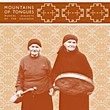|
|

Various Artists In 2012, A Hawk And A Hacksaw started their own label: L.M. Dupli-cation, or Living Music Dupli-cation. L.M.'s newest release, Mountains of Tongues: Musical Dialects of the Caucasus, was available from November 12th (on vinyl, disc and through digital download). This is very different music for sure. Let's quote the label to see what this is about: 'Mountains of Tongues... includes recordings of songs in languages that have rarely been caught on tape (Lezgi and Batsbi), instruments that only exist in extremely small numbers (the Tushetian chianuri, of which there are only two, and the agach komuz from the remote territory of Dagestan) and performances from a variety of underrepresented ethnic minority communities. These musicians, whether they recognize it or not, are guardians of the distinct musical cultures of the Caucasus, a region whose many traditions are still relatively unknown to the rest of the world.' Further, L.M. go on about the areas of origin for the music involved: 'Because of its unique geography - situated at the borders of Europe and Asia, between the Caspian and Black seas - the Caucasus has been at the crossroads of multiple empires as well as home to an exceptionally diverse population, resulting in a rich mosaic of history, culture, religion and language. Early Arab travelers referred to the region as the 'Mountains of Tongues', a term that reflected both the geographic and linguistic variety. An incredible number of languages and traditions still exist, but many have yet to be thoroughly documented and are close to disappearing completely.' This collection is about musical heritage and the preservation of musical culture and language. Like I said in the beginning of this article, A Hawk and A Hacksaw (who are Jeremy Barnes and Heather Trost) make sure to put out this recording document from all over Caucasus. The artwork is created by the Scottish artists Lucy Duncombe and Kenneth Wilson, who also make experimental music on the side (as Trees). They are based in Glasgow, and work as visual artist (audio-visual), illustrators, and musicians. Another creative/experimental artist has mastered the album, namely John Dieterich (of Deerhoof). Another crative mind inlvolved here has been Harry Wheeler who did the logo (for The Sayat Nova Project). Wheeler's from the creative 'think-tank'/organization/label Architects of Harmonic Rooms. He's a film maker, a graphic designer, and a musician. Wheeler writes for The Wire, and he works for Folk Radio and Freq.) I mentioned The Sayat Nova Project, which is a non-profit group (set up by Ben Wheeler, Stefan Williamson-Fa and Anna Harbaugh) with the goal of preserving and promoting the musical dialects of the Caucasus. Well, yes, the main artists on Mountains of Tongues... are the musicians of Caucasus. The real players are all the musicians included on this album. The musicians whose musical escapades are exposed through all the songs included on this album which documents this project. The recordings on Mountains of Tongues... were made between September 2012 and June 2013 in villages, towns and cities across the South Caucasus. Members of the The Sayat Nova Project recorded more than 50 musicians playing a wide variety of instruments and singing in ten different languages. Like The Sayat Nova state: '...the album presents the music of the Caucasus without regard to political borders. Through the inclusion of recordings by Armenians, Azerbaijanis, Georgians, Chechens and many others ethnicities, it represents this region's unique traditions and shared histories and emphasize the diversity that exists within these 'mountains of music'.' Listening to all these tracks in a short time might be overwhelming. Some of these songs can be to intense. The song-writing, the vocals, the tongue, the sound of the instruments, the arrangements - it can all be a bit too different and heavy for a pair of ears or a set of mind used to western European, Anglo-American popular music. But I guess that if you (or as you) dig deeper into this mountain of songs (19 to be precise), you'll end up a richer and a stronger person. I dare you to (I even dare myself...). To give this album a listen will rinse and refresh your identity, or your ability to identify music by listening. Use your ears, and your imagination. For the last 2000 years, the Caucasus region has been constantly cghanging, being dragged between folks, countries, empires, and holds a rich mosaic of the most spectacular mix of history, culture, religion, and language. I guess that most of us Westerners will call this 'folk music'. Well...: In folk we trust. To quote Julian Cowley, of The Wire music magazine: 'The joy of Mountains of Tongues is that is leaves the ethnic, self-identifying dimension of these unfamiliar musical utterances intact, and the poetry still shines through.' Go to the mountain, and explore all what's to explore. You'll be exposed to 'precious recordings full of wonder, grit and beauty...' (Honest Jon's Records). You might add magic, mystery, and spellbinding finds on your way to the top. When Stefan Williamson Fa and Ben Wheeler left for a journey across the wild Caucasus, 'situated at the borders of Europe and Asia (between the Caspian and Black seas)' (Wikipedia), some two years ago, gathering/filling what was to become this album they stated: 'Our journey to collect these recordings began with a gathering of goats and Azeri bards on the side of a dirt track road in Georgia and ended in a dark kitchen in a Molokan collective in Azerbaijan, a Christian sect banished from Russia to the Caucasus in the 19th Century. We travelled through the three countries of the South Caucasus - Georgia, Armenia and Azerbaijan - fueled by cheese pies and glasses of wine that were endlessly offered to us by our hosts.' (The Sayat Nova Project) Copyright © 2015 Hourig Öppöÿen
|
| © 2015 Luna Kafé |